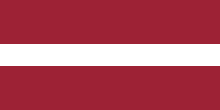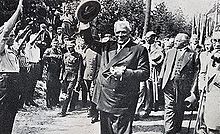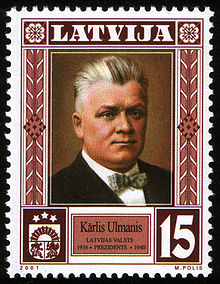Kārlis Ulmanis

Kārlis Ulmanis (September 4, 1877 – September 20, 1942) was a leader of the Latvian independence movement, who served intermittently as the Prime Minister and President of Latvia until the Soviet takeover on 21 July 1940. Ulmanis was deported to Russia and ultimately died of dysentery in prison in Krasnovodsk, Turkmenistan.[1]
Background
[change | change source]Early life
[change | change source]Ulmanis started out as an agricultural scientist in Latvia, who studied agronomy[2] in Germany. In 1905, he joined the Russian Revolution and got detained, but managed to escape and flee to the United States, where he earned a degree in agriculture at the University of Nebraska–Lincoln and taught as a lecturer.[1][3]
World War I
[change | change source]Ulmanis returned to Latvia in 1913 when Tsar Nicolas II declared a general amnesty. In 1915, Latvia was occupied by the German Empire amid World War I. In 1918, Ulmanis founded the Latvian Farmers' Union and co-founded the People's Council to prepare for independence from Russia.[1][3]
Independent Latvia
[change | change source]
Ulmanis led the People's Council to declare Latvia's independence on 18 November 1918, becoming the first Prime Minister of Latvia. The nascent Republic of Latvia was invaded by Soviet Russia aided by native Latvian communists.[4] With help from the Baltic German, Finnish, Estonian and Polish forces and Anglo-French navies, the Latvian War of Independence was won.[1][5]
1934 coup d'état
[change | change source]

Just as other European states, Latvia's democracy was not immune to instability.[6] Amid instability posed by the ultranationalist Pērkonkrusts ("Thunder Cross") party[7] and the Nazified German minority, Kārlis Ulmanis and general Jānis Balodis launched a coup d'état, dissolving the Saeima (Latvian Parliament) and all parties.[8]

Individuals across the spectrum, including the Pērkonkrusts, were jailed. In 1936, Ulmanis took over the positions of both President and Prime Minister, ruling until the Soviet annexation.[8][9]
Ideology
[change | change source]Several historians deemed Kārlis Ulmanis nationalist and authoritarian. Latvianization was reportedly enforced in education to assimilate minorities, which also greatly improved the literacy among the populace.[9][10] It is claimed that all secular Yiddish schools were closed, while considerable restrictions were imposed on Hebrew schools.[11][12]
Final years
[change | change source]
Following the Soviet annexation of Latvia, Ulmanis was deported to Russia and ultimately died of dysentery in prison in present-day Turkmenistan's Krasnovodsk.[1][3]
Assessment
[change | change source]

Kārlis Ulmanis has been a controversial figure since the end of WWII. In Soviet historiography, Ulmanis was demonized as a "corrupt fascist culpable for the bloody repression of Latvian workers." Whereas, the then-Soviet ruler Joseph Stalin committed several genocides across the Soviet Union, killing up to 20 million,[14] including the Holodomor and deportation of 10% of Baltic states' population.[15]
In present-day Latvia, Ulmanis holds substantial appeal among Latvians for his vital role in Latvia's nation-building. His achievements in his early years of prime ministership are viewed positively by historians,[16] despite criticism of his high-handed rule between 1934 and 1940.[17]
Trivia
[change | change source]It is claimed that Kārlis Ulmanis never married or dated. When asked, he answered,[18]
I am married to Latvia, and that is enough for me.
Related pages
[change | change source]References
[change | change source]- ↑ 1.0 1.1 1.2 1.3 1.4 "Kārlis Ulmanis". Britannica. August 31, 2024. Retrieved October 27, 2024.
- ↑ The science of soil management and crop production. Oxford Languages.
- ↑ 3.0 3.1 3.2 "Former presidents of Latvia: Kārlis Ulmanis". President of the Republic of Latvia. March 16, 2021. Retrieved October 27, 2024.
- ↑ Minins, Aldis (2015). "Latvia, 1918–1920: A Civil War?". Journal of Baltic Studies. 46 (1): 49–63. JSTOR stable/26764079. Retrieved October 27, 2024.
- ↑ "Letland §5. Geschiedenis". Encarta Encyclopedie Winkler Prins (in Dutch). Microsoft Corporation/Het Spectrum. 2002.
- ↑ Morgan, Philip (2003). Fascism in Europe, 1919-1945 (1 ed.). Retrieved October 27, 2024.
- ↑ Kott, Matthew (November 23, 2015). "Latvia's Pērkonkrusts: Anti-German National Socialism in a Fascistogenic Milieu". Fascism. 4 (2): 169–193. Retrieved October 27, 2024.
- ↑ 8.0 8.1 Bērziņš, Valdis, ed. (2003). 20. gadsimta Latvijas vēsture II: Neatkarīgā valsts 1918–1940 (in Latvian). Riga: Latvijas Vēstures institūta apgāds. ISBN 9984-601-18-8. OCLC 45570948.
- ↑ 9.0 9.1 Purs, Aldis (2002). "The Price of Free Lunches: Making the Frontier Latvian in the Interwar Years" (PDF). The Global Review of Ethnopolitics. Archived from the original (PDF) on 2016-03-04.
- ↑ Horváth, István (2003). Minority politics within the Europe of regions. Bucharest: Editura ISPMN. ISBN 9789731970837.
- ↑ Dov Levin (ed.), Pinkas Hakehilot Latvia and Estonia (1988).
- ↑ "Latvia". Jewish Virtual Library. Retrieved October 27, 2024.
- ↑ 日本語: ネブラスカ大学リンカーン校に設置されたカールリス・ウルマニスの記銘板
- ↑
- Conquest, Robert (1968). The Great Terror: Stalin’s Purge of the Thirties. Penguin Books. ISBN 9781847925688. Retrieved October 27, 2024.
- Keller, Bill (February 4, 1989). "Major Soviet Paper Says 20 Million Died As Victims of Stalin". The New York Times. Retrieved October 27, 2024.
- Naimark, Norman M. (December 25, 2011). Stalin's Genocides. ISBN 9780691152387. Retrieved October 27, 2024.
The chilling story of Stalin's crimes against humanity
- ↑
- Aurélie, Campana (November 5, 2007). "The Soviet Massive Deportations - A Chronology". The Asia-Pacific Journal. Sciences Po. ISSN 1961-9898. Retrieved October 27, 2024.
- Davoliūtė, Violeta; Balkelis, Tomas (2018). Narratives of Exile and Identity: Soviet Deportation Memoirs from the Baltic States. Central European University Press. ISBN 978-963-386-184-4. JSTOR stable/10.7829/j.ctv4cbhvq. Retrieved October 27, 2024.
- Sander, Gordon F. (April 2, 2022). "Long before Ukrainian deportations, Soviets abducted Baltic citizens". The Washington Post. Retrieved October 27, 2024.
- ↑ "The Blurring of Lines: Democracy, Vadonisms, and Latvia in Transnational Context". The Centenary of Latvia’s Foreign Affairs. Retrieved October 27, 2024. Vadonisms: The Latvian equivalent of the German term Führerprinzip, it means “Leaderism” or “the leader principle”.
- ↑
- Ščerbinskis, Valters (2011). "Leaders, Divided Society and Crisis. The Coup d'État of 1934 in Latvia, its Causes and Consequences". Forgotten Pages in Baltic History. pp. 187–209. doi:10.1163/9789042033160_011. Retrieved October 27, 2024.
- Tēraudkalns, Valdis; Hanovs, Deniss (February 6, 2014). "Happy Birthday, Mr. Ulmanis! Reflections on the Construction of an Authoritarian Regime in Latvia". Politics, Religion & Ideology. 15 (1): 64–81. doi:10.1080/21567689.2013.849585. Retrieved October 27, 2024.
- Stranga, Aivars (2018). "The Political System and Ideology of Karlis Ulmanis's Authoritarian Regime: May 15, 1934 – June 17, 1940". War, Revolution, and Governance. Academic Studies Press. doi:10.1515/9781618116215-005. Retrieved October 27, 2024.
- ↑ Hanovs, Deniss; Tēraudkalns, Valdis (2013). Ultimate Freedom – No Choice: The Culture of Authoritarianism in Latvia from 1934–1940. Brill. ISBN 9789004243552. Retrieved October 27, 2024.
